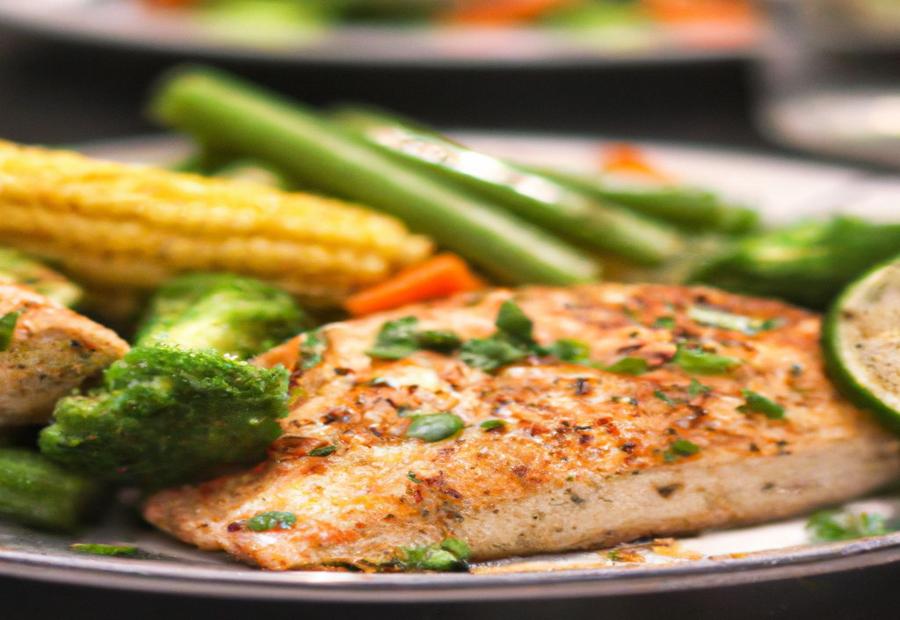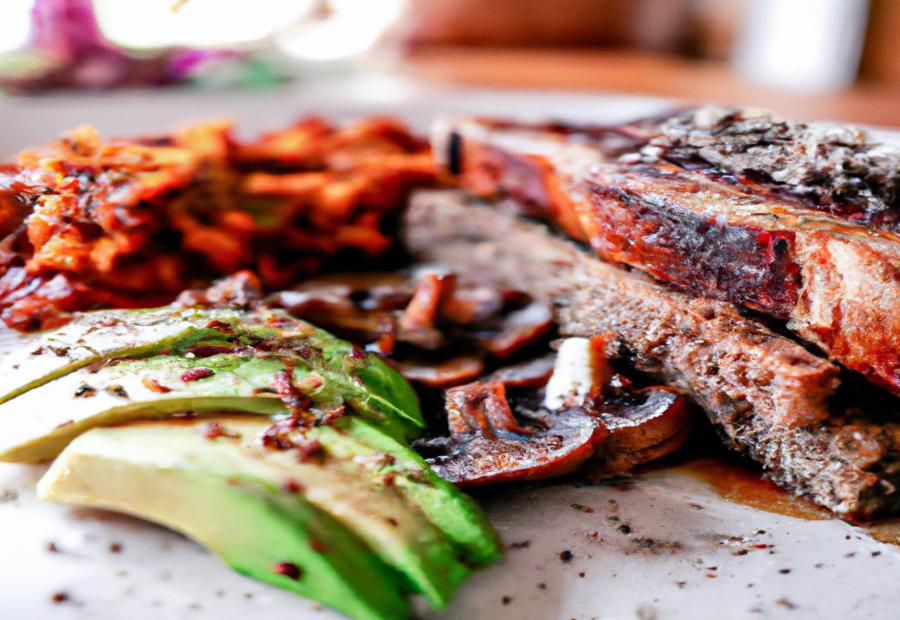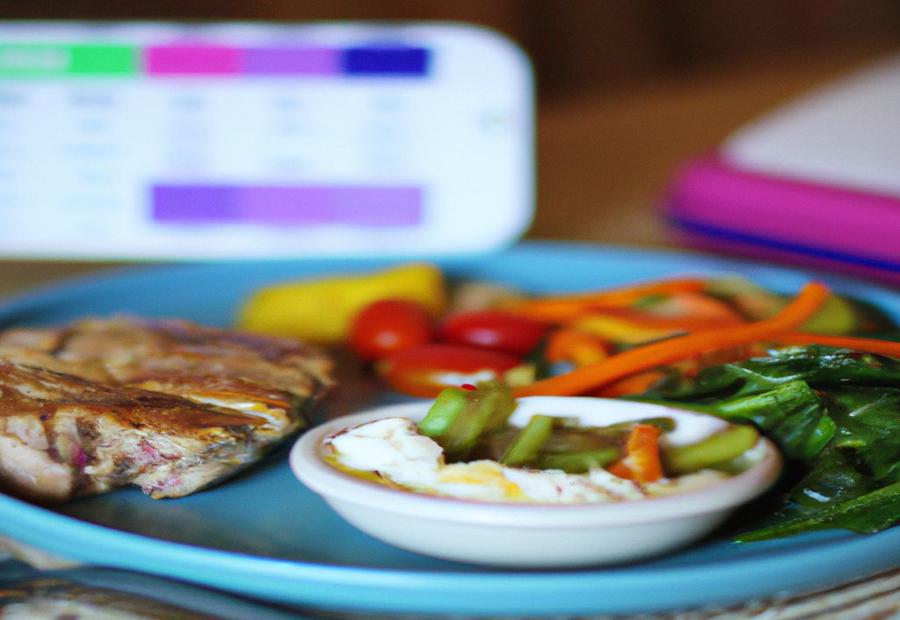Protein plays a vital role in weight loss and achieving a healthy body composition. Understanding its significance and knowing the recommended daily protein intake can greatly aid in your weight loss journey.
When it comes to weight loss, protein intake varies depending on factors such as activity level and individual goals. For sedentary individuals, the recommended daily protein intake is lower compared to active individuals.
Protein helps in weight loss through various mechanisms. Firstly, it increases satiety and reduces appetite, leading to fewer cravings and a lower overall calorie intake. Secondly, protein boosts metabolism and increases calorie burning during digestion and nutrient processing. Lastly, protein preserves lean muscle mass while promoting fat loss, which is crucial for a healthy and sustainable weight loss journey.
Several factors affect protein requirements for weight loss. Body weight and composition, physical activity level, age, gender, and health conditions all play a role in determining the right protein intake.
Calculating protein needs for weight loss can be done by using the percentage of calorie intake or considering body weight. These methods provide a guideline to determine the appropriate protein intake for your individual needs.
To incorporate protein into a weight loss diet, it is essential to choose high-quality protein sources such as lean meats, poultry, fish, eggs, dairy products, legumes, and plant-based proteins. Distributing protein throughout the day helps optimize muscle protein synthesis and supports weight loss goals. Balancing protein with other essential nutrients, such as carbohydrates and healthy fats, ensures a well-rounded and nourishing diet.
Monitoring progress and adjusting protein intake based on weight loss goals and body composition changes is important for long-term success. Regularly assessing progress and adapting protein intake accordingly can help optimize weight loss results.
By understanding the role of protein in weight loss, determining the recommended daily protein intake, and implementing strategies to incorporate protein into your diet, you can enhance your weight loss journey and achieve your desired results efficiently and effectively.
Understanding the Role of Protein in Weight Loss

Photo Credits: Weightlosteacher.Com by Charles Garcia
Protein plays a crucial role in weight loss. Here are some important factors to understand about protein in weight loss:
1. Muscle preservation: Protein helps build lean muscle mass, which burns more calories than fat, even at rest.
2. Increased metabolism: Protein has a higher thermic effect compared to carbohydrates and fats, meaning the body uses more energy to digest and process protein. This boosts metabolism and increases calorie burn.
3. Appetite control: Protein is more satiating than carbohydrates and fats, reducing appetite and controlling cravings. This can lead to decreased calorie intake and support weight loss efforts.
4. Muscle recovery and repair: Protein is essential for repairing and rebuilding muscles after exercise, especially for those engaging in regular physical activity to support weight loss.
5. Nutrient density: High-quality protein sources like lean meats, fish, legumes, and dairy products not only provide protein but also essential nutrients like vitamins and minerals. These nutrients are important for overall health and well-being.
Understanding the role of protein in weight loss is essential for an effective and sustainable weight loss plan. Incorporating protein-rich foods into meals and snacks helps support muscle preservation, increase metabolism, control appetite, promote muscle recovery, and provide important nutrients.
What is the Recommended Daily Protein Intake?

Photo Credits: Weightlosteacher.Com by Kevin Thompson
Discovering the ideal daily protein intake for weight loss can be a transformative journey. In this section, we unravel the mystery behind the recommended daily protein intake. Whether you lead a sedentary lifestyle or have an active routine, understanding the significance of protein in these contexts will empower you to make informed dietary choices. Get ready to uncover the key insights into protein intake for both sedentary and active individuals – a valuable source of knowledge to support your weight loss goals.
Protein Intake for Sedentary Individuals
Protein intake is crucial for overall health and weight loss, especially for sedentary individuals. Here are some important points to consider for sedentary individuals looking to improve their protein intake:
1. Sufficient protein consumption: Sedentary individuals should aim to consume enough protein to meet their body’s needs and maintain muscle mass, even with their lower activity level.
2. Recommended daily intake: For sedentary individuals, it is recommended to have a protein intake of 0.8 grams per kilogram of body weight.
3. Protein sources: When choosing protein sources, opt for lean meats, poultry, fish, eggs, dairy products, legumes, and plant-based proteins like tofu and tempeh. These are high-quality sources of protein.
4. Distribution throughout the day: To optimize the utilization of amino acids for muscle maintenance, spread out your protein intake evenly throughout the day by including it in each meal and snack.
5. Timing considerations: There is no specific requirement for the timing of protein intake. It can be spread out over the day according to personal preference and schedule.
By considering these factors, sedentary individuals can ensure they receive adequate protein to support their overall health and weight loss goals. Remember, it is always advisable to consult with a healthcare professional or registered dietitian for personalized recommendations.
Protein Intake for Active Individuals
Protein intake is of utmost importance for active individuals, especially for their muscle recovery and growth. It plays a crucial role in enhancing exercise performance and meeting the increased energy requirements. Here are some vital points to consider when it comes to protein intake for active individuals:
1. Increased Protein Requirements: Active individuals require more protein compared to sedentary individuals to promote muscle repair and growth. As a general guideline, it is recommended to consume 1.2-2.0 grams of protein per kilogram of body weight per day.
2. Timing: For optimal muscle protein synthesis and recovery, it is advisable to distribute protein intake evenly throughout the day. Aim to consume protein within 1-2 hours before and after exercise.
3. High-Quality Sources: To ensure the provision of essential amino acids necessary for muscle repair and growth, opt for lean sources of protein such as chicken, turkey, fish, eggs, tofu, legumes, and dairy products.
4. Protein and Carbohydrate Balance: To enhance muscle glycogen replenishment and overall recovery post-workout, it is beneficial to consume a combination of carbohydrates and protein. Aim for a ratio of 3:1 carbohydrates to protein.
5. Hydration: Maintaining proper hydration is crucial for active individuals. Fluids, particularly water or sports drinks without added sugars, aid in the transportation of nutrients, including proteins, to the muscles.
6. Individual Variations: Protein requirements may vary based on factors such as body weight, exercise intensity and duration, training goals, and individual response. It is advisable to consult a registered dietitian or nutritionist to personalize your protein intake.
How Does Protein Aid in Weight Loss?
In the quest to shed those unwanted pounds, the role of protein cannot be overlooked. So, let’s unravel the wonders of protein in our weight loss journey. Prepare to discover how protein works its magic by enhancing satiety and curbing our appetite. Get ready to be amazed by its ability to ramp up our metabolism, turning us into calorie-burning machines. And hold on tight as we unveil how protein safeguards our precious lean muscle mass. Brace yourself for an enlightening journey into the power of protein for weight loss!
Increased Satiety and Reduced Appetite
Increased satiety and reduced appetite are benefits of protein in a weight loss diet. Protein has a high satiety value, keeping you full for longer, preventing overeating and unnecessary snacking. Protein reduces appetite by affecting hunger-regulating hormones, increasing levels of hormones like peptide YY and GLP-1 that signal fullness and control cravings. Research shows protein intake leads to decreased overall calorie intake as individuals naturally eat less when consuming more protein. Protein also stabilizes blood sugar levels, preventing hunger spikes and cravings. Including protein in a weight loss diet increases satiety, reduces appetite, and helps stick to calorie goals and maintain a healthy eating pattern.
Boosted Metabolism and Calorie Burning
Boosting metabolism and calorie burning are crucial elements in achieving weight loss. Protein plays a vital role in enhancing these processes in several ways:
– Protein possesses a higher thermic effect compared to carbohydrates and fats. As a result, the body requires more energy to process protein, leading to an increased calorie burn.
– Protein stimulates muscle growth and repair. Building more lean muscle mass elevates the resting metabolic rate, ultimately resulting in higher calorie burning even when the body is at rest.
– Consuming adequate amounts of protein prevents muscle loss during weight loss, thereby maintaining an elevated metabolism.
– Protein has a high level of satiety, which helps in keeping you feeling fuller for a longer period of time. This, in turn, prevents excessive calorie intake.
– Additionally, protein improves insulin sensitivity, which regulates blood sugar levels and promotes stable calorie burning.
Incorporating enough protein into your diet is essential to support a boosted metabolism and calorie burning for effective weight loss. It is advisable to prioritize high-quality sources of protein and evenly distribute protein intake throughout the day.
Preservation of Lean Muscle Mass
- The preservation of lean muscle mass during weight loss is crucial.
- Protein is essential for supporting muscle repair and growth.
- When in a calorie deficit for weight loss, the body may break down muscle tissue for energy.
- Adequate protein consumption can help prevent muscle breakdown and support muscle maintenance.
- Research suggests that consuming 0.6-0.9 grams of protein per pound of body weight helps preserve lean muscle mass during weight loss.
- For example, if a person weighing 150 pounds, they should consume 90-135 grams of protein per day.
- Including protein-rich foods like lean meats, poultry, fish, eggs, dairy, legumes, and tofu in your diet can effectively meet protein needs.
- To optimize muscle maintenance, it is recommended to distribute protein intake evenly throughout the day.
- In addition to protein, incorporating resistance training exercises is essential for preserving and building lean muscle mass during weight loss.
- For proper guidance on protein intake according to your specific needs and goals, consult a healthcare professional or registered dietitian.
Factors That Affect Protein Requirements for Weight Loss

Photo Credits: Weightlosteacher.Com by Elijah Adams
When it comes to weight loss, understanding the factors that influence your protein requirements is key. In this section, we’ll explore the various elements that affect how much protein you should consume. From your body weight and composition to your physical activity level, age, gender, and health conditions – each factor plays a vital role. By unraveling these aspects, we can uncover the optimal protein intake needed to support your weight loss journey effectively. Let’s dive in and discover what influences your protein needs!
Body Weight and Composition
Body Weight and Composition
When it comes to weight loss, understanding your body weight and composition is crucial. Your body weight refers to the mass of your body, while composition refers to the proportion of fat, muscle, and other tissues in your body.
Factors Description
Body Weight Your body weight plays a significant role in determining your protein requirements for weight loss. Individuals with higher body weights may need more protein to support muscle maintenance and promote fat loss.
Body Composition Your body composition, specifically the proportion of muscle mass, plays a vital role in determining protein needs. Adequate protein intake helps preserve lean muscle mass while losing weight, which is essential for maintaining a healthy metabolism and reducing the risk of weight regain.
By taking your body weight and composition into account, you can calculate the optimal amount of protein needed to support your weight loss goals. It is important to consult with a healthcare professional or registered dietitian to determine the appropriate protein intake for your specific needs.
Physical Activity Level
Physical Activity Level
When it comes to weight loss, your physical activity level determines your protein requirements.
1. Low physical activity level: If you lead a sedentary lifestyle with minimal exercise or movement, aim for a protein intake of approximately 0.8 grams per kilogram of body weight per day.
2. Moderate physical activity level: If you engage in moderate exercise or activities like 30 minutes of brisk walking or light cardio workouts, increase your protein intake to 1.2-1.5 grams per kilogram of body weight per day.
3. High physical activity level: If you have a high level of physical activity, such as intense workouts, weightlifting, or endurance training, you will need more protein to support muscle repair and growth. Aim for a protein intake of 1.6-2.2 grams per kilogram of body weight per day.
Matching your protein intake to your physical activity level optimizes your weight loss efforts and supports your overall fitness goals.
Physical activity has always been an essential part of human life. It shapes our bodies and minds. It helps maintain a healthy weight, boosts mood, improves cardiovascular health, and enhances overall well-being. Whether through a structured workout routine or staying active throughout the day, prioritizing physical activity is key to leading a healthy and fulfilling life.
Age and Gender
Age and gender play a significant role in determining the protein requirements for weight loss.
For children between the ages of 4 and 13, it is recommended to consume 0.95 grams of protein per kilogram of body weight.
Adolescents aged 14 to 18 need approximately 0.85 grams of protein per kilogram of body weight.
Adults between the ages of 19 and 59 should aim for 0.8 grams of protein per kilogram of body weight.
As for individuals aged 60 and above, their protein requirement increases to 1.0 grams per kilogram of body weight.
Pregnant women, on the other hand, are advised to consume 1.1 grams of protein per kilogram of body weight.
Keep in mind that these recommendations are based on average needs and may vary depending on various factors, including activity level, muscle mass, and specific health goals.
For personalized advice on protein requirements based on age, gender, and weight loss goals, it is recommended to consult with a healthcare professional or a registered dietitian.
Health Conditions and Goals
Health Conditions and Goals are important factors that affect protein requirements for weight loss. Those with health conditions like diabetes or kidney disease may have different protein needs and should consult a healthcare professional for personalized recommendations. Similarly, individuals with goals like muscle building or injury recovery may require higher protein intake.
To achieve optimal weight loss, it is important to consider individual goals. For instance, someone who wants to lose weight while preserving muscle mass may benefit from a higher protein intake. However, individuals with certain health conditions such as kidney disease may need to limit their protein intake.
Furthermore, age also plays a role in protein requirements. Older adults may require higher protein intake to prevent muscle loss and maintain overall health.
When determining protein intake for weight loss, it is crucial to have realistic goals and take into account individual health conditions. Seeking guidance from a registered dietitian or healthcare professional can provide personalized advice based on specific health conditions and goals.
Calculating Protein Needs for Weight Loss
When it comes to weight loss, understanding how much protein to consume is crucial. In this section, we’ll dive into the science-backed methods of calculating protein needs specifically for weight loss. We’ll explore two approaches: using the percentage of calorie intake and using body weight. By revealing these calculation methods, we’ll empower you to make informed decisions about the ideal protein intake for your weight loss journey. So, let’s get to the nitty-gritty and uncover the numbers behind effective weight loss protein strategies!
Using Percentage of Calorie Intake
Using the percentage of calorie intake is a helpful method for determining protein needs when aiming for weight loss. To accurately calculate your protein intake based on a percentage of your daily calorie intake, follow these steps:
1. Start by calculating your daily calorie intake. Multiply your body weight in pounds by a factor of 10-12, depending on your activity level. For instance, if you weigh 150 pounds and have a moderate activity level, your daily calorie intake might range from 1800-2200 calories.
2. Determine the percentage of calories designated for protein. A general guideline for weight loss is to consume 15-30% of your daily calories from protein. For example, if you choose 20% and your daily calorie intake is 2000 calories, aim to consume 400 calories (20% of 2000) worth of protein.
3. Convert the calorie count to grams by dividing the protein calories by 4. This is because there are 4 calories in a gram of protein. Using the previous example, dividing 400 calories by 4 equals a daily protein goal of 100 grams.
4. Plan your meals and snacks around protein-rich foods that align with your calculated protein goal. Opt for high-quality protein sources such as lean meats, poultry, fish, eggs, dairy products, legumes, and tofu.
5. Continuously monitor your progress and adjust your protein intake as needed. If you’re not seeing the desired results, consider increasing or decreasing your protein intake and reassessing your overall calorie and nutrient balance.
Pro-tip: Keep in mind that individual protein needs can vary based on factors like muscle mass, body composition, and specific weight loss goals. For personalized guidance on protein intake, it’s advisable to consult a registered dietitian or nutritionist.
Using Body Weight
Using Body Weight
When determining protein intake for weight loss, consider your body weight. Here are some important points to keep in mind:
1. Calculate protein needs based on body weight. The recommended daily protein intake for weight loss is around 0.8-1 gram per kilogram of body weight. For example, if you weigh 70 kilograms, your protein intake should be between 56-70 grams per day.
2. Adjust protein intake based on activity level. If you are more physically active, you may require a higher protein intake to support muscle recovery and growth.
3. Consider health conditions and weight loss goals. If you have specific health conditions or weight loss objectives, consult with a healthcare professional or registered dietitian to determine optimal protein intake.
4. Choose high-quality protein sources. Incorporate lean meats, poultry, fish, eggs, dairy products, legumes, and plant-based protein sources into your diet.
5. Distribute protein intake throughout the day. Aim to have protein with each meal and snack to promote satiety and maintain muscle mass.
6. Balance protein with other essential nutrients. Don’t neglect carbohydrates, healthy fats, vitamins, and minerals.
By considering your body weight and following these guidelines, you can determine the appropriate protein intake to support your weight loss journey.
The practice of using body weight to determine protein intake dates back to the mid-19th century. German nutritionist Carl von Voit proposed that protein requirements should be based on body weight. This idea revolutionized nutrition and influenced the establishment of protein guidelines worldwide. Today, using body weight as a determinant of protein intake is widely accepted in the field of weight loss and nutrition.
How to Incorporate Protein into a Weight Loss Diet?
Looking to shed some pounds? Discover how to effortlessly add protein to your weight loss journey. From selecting top-notch protein sources to cleverly distributing your intake throughout the day, we’ve got you covered. Find out how to strike the perfect balance with other nutrients while achieving your weight loss goals. So, let’s dive in and uncover the secrets of incorporating protein into a diet designed for shedding those extra pounds.
Choosing High-Quality Protein Sources
Choosing High-Quality Protein Sources
When selecting high-quality protein sources for weight loss, consider nutritional content, source, and preparation methods. Here are some options to include in your diet:
- Lean meats: Choose lean cuts of poultry like chicken breast or turkey for low-fat, high-protein options. Similarly, lean cuts of beef and pork provide quality protein.
- Fatty fish: Salmon, tuna, and mackerel are rich in protein and omega-3 fatty acids, which offer numerous health benefits.
- Eggs: Eggs are a complete protein source, providing all essential amino acids. They can be boiled, scrambled, or poached.
- Dairy products: Milk, yogurt, and cheese are excellent protein sources, especially Greek yogurt with its higher protein content.
- Lentils and legumes: These plant-based protein sources are high in protein and fiber, which promote feelings of fullness.
- Tofu and tempeh: Soy-based products popular among vegetarians and vegans. They add versatility to recipes.
- Nuts and seeds: Almonds, walnuts, chia seeds, and hemp seeds contain protein along with healthy fats and essential nutrients.
Incorporating these high-quality protein sources into your weight loss diet ensures adequate protein for your goals while enjoying a variety of flavors and textures.
Distributing Protein throughout the Day
Distribute protein throughout the day to maximize weight loss benefits. Follow these guidelines:
1. Incorporate protein-rich foods into every meal and snack. Choose lean meats, poultry, fish, eggs, dairy products, legumes, and nuts to ensure a steady supply of amino acids.
2. Ensure an even distribution of protein consumption throughout the day. Aim for 20-30 grams of protein per meal or snack to enhance muscle protein synthesis and satiety.
3. Make sure to have a source of protein for breakfast. This will help regulate appetite and prevent overeating later in the day.
4. Spread your protein intake over 3-4 meals and 1-2 snacks. This will maintain a consistent supply of amino acids for muscle repair and growth.
5. Take into consideration the timing of your workouts. Consume protein within an hour after exercise to improve muscle recovery and growth.
6. Pay attention to your body’s hunger and fullness signals. Adjust your protein intake based on your individual preferences and needs.
By incorporating protein throughout the day, you can optimize weight loss, preserve muscle, and control appetite.
Balancing Protein with Other Nutrients
When it comes to weight loss, it is important to balance protein with other nutrients for a healthy diet. Here are some key factors to consider:
1. Serving sizes: Pay attention to the portion sizes of different foods to ensure that you are getting a balanced mix of macronutrients. Pair a serving of lean protein, such as grilled chicken, with vegetables and a small portion of whole grains.
2. Variety of food groups: Incorporate a wide range of nutrient-dense foods from different food groups. This will provide a balance of protein, carbohydrates, and fats, as well as a variety of vitamins, minerals, and fiber.
3. Timing of meals: Distribute your protein intake evenly throughout the day to support muscle growth, repair, and satiety. Aim for approximately 20-30 grams of protein per meal.
4. Healthy fats: Include sources of healthy fats, such as avocados, nuts, and olive oil, in your diet. These fats provide essential nutrients, help you feel satisfied, and maintain stable blood sugar levels.
5. Carbohydrates: Choose complex carbohydrates like whole grains, legumes, and fruits that provide sustained energy and fiber. Avoid overly processed and refined carbohydrates, as they can cause spikes in blood sugar levels.
By incorporating these tips, you can create a well-balanced diet that supports weight loss while ensuring you receive all the necessary nutrients for overall health.
Let me share a true story about Sarah, a woman who struggled with weight loss. Sarah focused on balancing her protein intake with other nutrients. She incorporated lean protein sources like chicken, fish, and tofu into her meals. Alongside the protein, she included a variety of vegetables, whole grains, and healthy fats. As a result, Sarah felt more satisfied after her meals and had more energy throughout the day. She also managed to lose weight steadily while enjoying a balanced and delicious diet. Balancing protein with other nutrients became a key part of Sarah’s successful weight loss journey.
Monitoring Progress and Adjusting Protein Intake

Photo Credits: Weightlosteacher.Com by Jose King
Monitoring progress and adjusting protein intake are critical factors in achieving weight loss goals. To ensure successful weight loss, it is important to incorporate the following steps:
1. Regularly weigh yourself to assess the pace of weight loss.
2. Keep a food diary to track protein intake and identify any gaps.
3. Monitor body measurements such as waist circumference and body fat percentage to gauge changes in body composition.
4. Pay attention to energy levels and overall well-being to ensure that you are consuming sufficient amounts of protein.
5. For personalized recommendations, consult with a registered dietitian or nutritionist.
Based on the monitoring process, make the following adjustments to your protein intake:
1. If weight loss progress is slow, consider increasing your protein intake by 5-10% of your total calorie intake.
2. If weight loss is too rapid, evaluate your protein needs and adjust accordingly.
3. Continuously monitor and adjust your protein intake based on your progress, your body’s response, and your dietary requirements.
By consistently monitoring your progress and making necessary adjustments to your protein intake, you can optimize your weight loss journey and achieve the desired results.
Frequently Asked Questions
How much protein should I eat for weight loss?
Protein plays a crucial role in weight management and weight loss. The recommended daily protein intake for healthy adults is 10-35% of total calorie intake. Studies suggest that getting 25-30% of calories from protein, or 1-1.2 grams per kilogram of ideal body weight per day, may be beneficial for weight loss.
How do I calculate my protein needs for weight loss?
To determine how much protein you need for weight loss, you can use a protein intake calculator based on scientific studies. The calculator takes into account factors such as your body weight, muscle mass, and activity level to provide you with an estimate of your daily protein requirement for building muscle or maintaining lean muscle mass while losing fat.
What are the best sources of protein for weight loss?
Good sources of protein for weight loss include animal-based foods such as meats, fish, poultry, eggs, and dairy, as well as plant-based foods such as beans, lentils, tofu, nuts, and seeds. It’s important to incorporate a variety of protein sources into your diet to ensure you are getting all the essential amino acids your body needs.
Can protein supplements help with weight loss?
Protein supplements can be a convenient way to increase your protein intake, but they should not be relied upon as a substitute for protein-rich foods. When choosing a protein supplement, make sure to consider factors such as protein content, carbohydrates, calories, and added sugar. It’s always best to consult with a registered dietitian or healthcare provider for personalized recommendations.
Are high-protein diets safe for everyone?
While high-protein diets can be effective for weight loss in the short term, they may not be suitable for everyone. Very high intakes of protein and fat can have negative effects on health, such as increasing the risk of type 2 diabetes and harming the kidneys. It is recommended to consult with a healthcare professional or registered dietitian before making significant changes to your diet.
What are the potential benefits of protein for weight loss?
Protein can aid in weight loss by increasing fullness, preserving lean body mass, increasing calorie burn during digestion, and helping to store less body fat. Protein has a thermogenic effect, meaning it requires more energy to digest compared to fat and carbs, leading to a small increase in metabolism and energy expenditure. Additionally, maintaining muscle mass is important for better body composition and efficient carbohydrate storage











